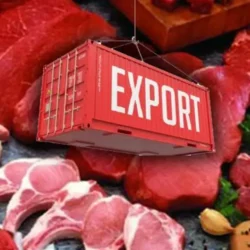Pretoria, Gauteng – South Africa is bracing for a high-stakes showdown with the United States over swingeing tariffs slapped on its agricultural exports by the current occupant of the White House. Agriculture Minister John Steenhuisen minced no words this week, revealing a frantic two-pronged strategy to either dramatically slash the punitive 30% levy – ideally to zero, or at least match the 10% burden faced by rival nations – or find new markets to cushion the blow.
The dramatic tariff hike, initially a retaliatory measure, was temporarily suspended for 90 days after a global market shudder. Now, South Africa finds itself lumped with a flat 10% tariff alongside its competitors, a situation Minister Steenhuisen warns still puts local producers at a significant disadvantage.
Speaking on the sidelines of a G20 agriculture working group meeting hosted in South Africa – a key event during the nation’s presidency of the influential grouping – a concerned Steenhuisen laid bare the potential devastation. “A 30% tariff hike… will lead to us not being competitive anymore in that particular market,” he stated, emphasizing the particular threat to citrus growers facing being priced out by competitors with the lower 10% levy.
The implications extend beyond mere tariffs. Steenhuisen lamented that the African Growth Opportunity Act (AGOA), a cornerstone of trade relations providing duty-free access to the US market, was now “all but cancelled in name” for South African goods. He also pointed to the wider global instability triggered by the uncertainty surrounding US trade policy, citing the International Monetary Fund’s downward revision of growth forecasts for major economies, including the US itself.
Undeterred, an interministerial task force, comprising Ministers Steenhuisen, Trade Industry and Competition’s Parks Tau, and International Relations and Cooperation’s Ronald Lamola, is spearheading the fightback. Their immediate focus is a charm offensive aimed squarely at Washington.
“Our plan is to use the next 90 days to approach the United States with some form of deal or package that we could put on the table… we would seek to retain access to the US market on a favourable basis for South African agricultural goods,” Steenhuisen declared. The goal is ambitious: to see the 30% tariff “lowered dramatically, hopefully, to no tariffs,” but with a 10% compromise as a crucial fallback to level the playing field.
Minister Steenhuisen argued that such a resolution would also serve American interests, highlighting the high quality and strong demand for South African agricultural products among US consumers. He warned of potential “price shocks” if the tariffs take full effect.
While the US tariff drama is unlikely to feature prominently in this week’s G20 agriculture talks due to the varied interests of member nations, South Africa is simultaneously pursuing a “two-track system.” This includes actively scouting for alternative markets to diversify its export destinations. Recent successes include opening doors for deciduous fruit in Thailand and table grapes in the Philippines, with ongoing efforts to forge new trade relationships. “So if Agoa is going to be cancelled, which seems likely, it won’t come as a major shock,” Steenhuisen asserted, signaling a pragmatic acceptance of a potentially shifting global trade landscape.
Earlier, in his opening address to the G20 meeting, Minister Steenhuisen underscored South Africa’s broader priorities during its presidency: fostering inclusive agricultural markets, empowering women and youth in the sector, promoting innovation, and building climate resilience – challenges he emphasized were shared global concerns aligned with the UN’s Sustainable Development Goals and the African Union’s Agenda 2063.
He poignantly noted the unequal distribution of the benefits of agricultural development, both within and between nations. “This is our opportunity to rethink the structures that keep the majority of producers – especially women and young people – on the margins of the sector,” he urged.
As South Africa grapples with rising input costs, climate shocks, and strained budgets, the fight against the US tariffs represents a crucial battle to protect its agricultural heartland and secure its place in the global market. The next 90 days will be critical in determining whether Pretoria can successfully navigate the turbulent waters of international trade under the current administration in Washington.




